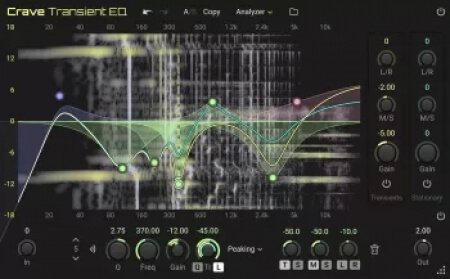Windows
Crave DSP Crave Transient EQ v1.0.2 [WiN]

MOCHA | 05 July 2023 | 3.46 MB
The Power of Three EQs
Crave Transient EQ is three powerful EQs in one plugin allowing you to dynamically equalize the transient and stationary components of your audio in parallel:
Transient and Stationary EQ
Using a proprietary algorithm developed in-house, audio is accurately separated into transient and stationary components that you can control independently using the per-band T/S knob. Much sharper detail is revealed than just the onset of percussion instruments. For instance, on a vocal track, the stationary signal will contain all the smooth musical elements, and the transient signal will contain all the harsh rapidly changing in-harmonic elements.
Dynamic EQ
There are four types of dynamics processing: downward compression, upward compression, downward expansion and upward expansion. These effectively boost or cut the quiet or loud parts of the signal. We've made this easy to understand by introducing Loud and Quiet buttons. Loud means the band will kick-in when the signal exceeds the threshold. Quiet means the band will kick-in when the signal is below the threshold. So, to boost only quiet parts of your audio, add a normal EQ boost, click Q, adjust the threshold, and away you go!
Parallel EQ
Parallel filters interact much less than their cascaded counterparts for more transparent dynamics. Using the M/S and L/R knobs parallel filters can be accurately positioned in the stereo field. Our filter technology is purpose built to handle rapidly modulating parameters and signals for transparent dynamics and transient handling.
High-Resoluton Spectrogram
The spectrogram can distinguish low frequencies while maintaining precise temporal resolution at high frequencies (even at maximum settings). Transients are highlighted in yellow for easy differentiation from stationary content. To enjoy the spectrogram in full detail, open the Analyzer menu and choose the largest Size.
home page
Crave Transient EQ is three powerful EQs in one plugin allowing you to dynamically equalize the transient and stationary components of your audio in parallel:
Transient and Stationary EQ
Using a proprietary algorithm developed in-house, audio is accurately separated into transient and stationary components that you can control independently using the per-band T/S knob. Much sharper detail is revealed than just the onset of percussion instruments. For instance, on a vocal track, the stationary signal will contain all the smooth musical elements, and the transient signal will contain all the harsh rapidly changing in-harmonic elements.
Dynamic EQ
There are four types of dynamics processing: downward compression, upward compression, downward expansion and upward expansion. These effectively boost or cut the quiet or loud parts of the signal. We've made this easy to understand by introducing Loud and Quiet buttons. Loud means the band will kick-in when the signal exceeds the threshold. Quiet means the band will kick-in when the signal is below the threshold. So, to boost only quiet parts of your audio, add a normal EQ boost, click Q, adjust the threshold, and away you go!
Parallel EQ
Parallel filters interact much less than their cascaded counterparts for more transparent dynamics. Using the M/S and L/R knobs parallel filters can be accurately positioned in the stereo field. Our filter technology is purpose built to handle rapidly modulating parameters and signals for transparent dynamics and transient handling.
High-Resoluton Spectrogram
The spectrogram can distinguish low frequencies while maintaining precise temporal resolution at high frequencies (even at maximum settings). Transients are highlighted in yellow for easy differentiation from stationary content. To enjoy the spectrogram in full detail, open the Analyzer menu and choose the largest Size.
home page
Only registered users can see Download Links. Please or login.


No comments yet